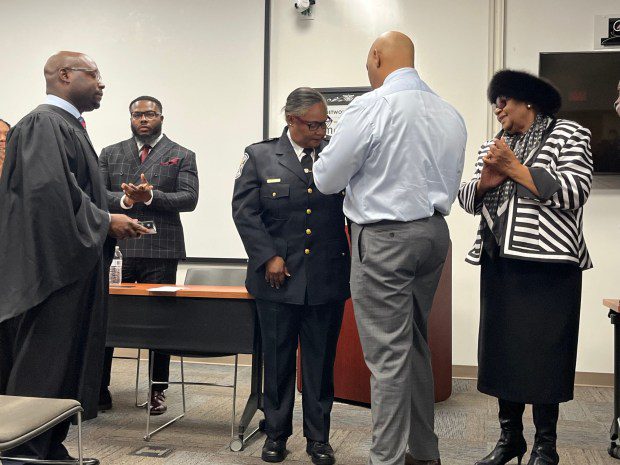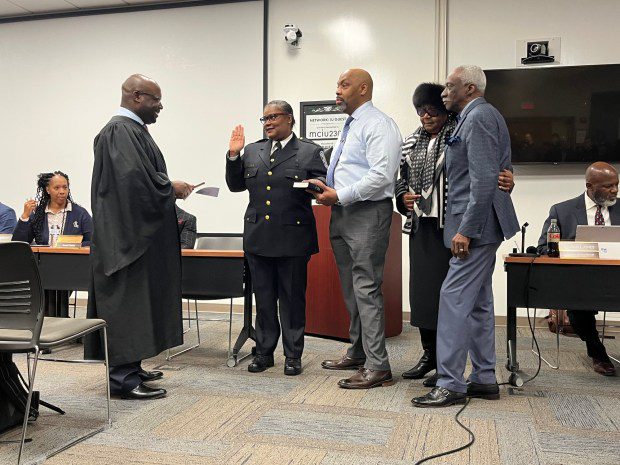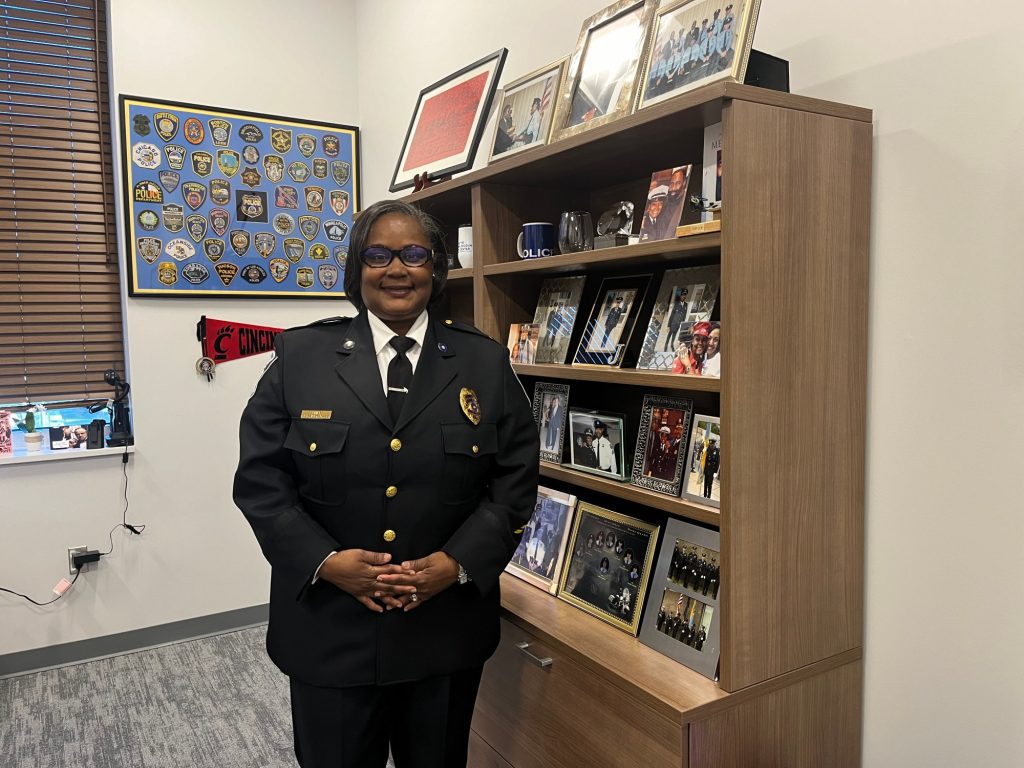NORRISTOWN — Norristown Police Chief Jacqueline Bailey-Davis wanted to lead a law enforcement agency.
She became the first female chief of the Norristown Police Department three months ago.
“I’m grateful for the opportunity, and I believe this is my greatest work, so I’m giving it my all,” said Bailey-Davis in an interview with MediaNews Group.
Bailey-Davis has been adjusting to the department, which had 55 patrol officers, seven detectives, a data analysis section, and a command staff as of December 2023.
While she has mainly focused on outlining key areas at the station, Bailey-Davis is eager to start patrolling the streets of the county seat.
“My vision for Norristown is simple,” she said. “I want to make it the safest place to live, work and visit, and I believe we can accomplish that because Norristown's issues can be managed. There are many quality of life issues that I am working to address right now.”

Bailey-Davis was endorsed by municipal officials and chosen by Norristown council members during the last meeting of 2023. The appointment was the result of 35 years of effort.
“It’s been a long time coming,” she said. “But I understand that the expectations are different for women, and I’m ready for the challenge.”
Raised in South Philadelphia
Bailey-Davis grew up in South Philadelphia with her mother, stepfather, and older sister. Despite moving to the city’s West Oak Lane and Mount Airy neighborhoods at the age of 9, she still feels connected to her roots in South Philadelphia.
“I loved it,” Bailey-Davis said. “Despite living in one of the city’s largest housing projects and experiencing a lot of violence, I felt safe because there was still a sense of community among the violence, and I had my family.”
Bailey-Davis highlighted the significant role her teachers played during her formative years, particularly Ron Cage, her history teacher at Dr. Martin Luther King Jr. High School in West Oak Lane.
“Mr. Cage was like a father figure, an uncle, and one of my favorite teachers,” she said, recalling a moment when he encouraged her to take the SAT.
Although Bailey-Davis initially had no interest in college, she ended up leaving Philadelphia for the University of Cincinnati after graduating in 1988. It wasn’t something she had planned, but an opportunity arose that she couldn’t pass up. Her father played a significant role in her decision, as she reconnected with him at 18 years old.
She said with a laugh that she had a chance to reconnect with her father and went to the University of Cincinnati on a scholarship from her father.
Going to Ohio was a new thing for her.
She said that Cincinnati felt a lot like Philadelphia in terms of community, but she had the opportunity to connect with different cultures and people in Ohio, whereas in Philadelphia she mainly interacted with one type of people.
Changing direction
She didn't consider law enforcement as a career, but taking a class on “Law and Black People” changed everything for her. The class focused on policing atrocities in specific communities of color, particularly Black people.
The professor asked about the most corrupt cities and police departments, and when students mentioned other places, he pointed out Philadelphia as well.
She remembered a professor asking her what she was going to do about the corruption in Philadelphia, to which she replied that she would join the police force and work towards changing the perception of policing.
She didn't agree with the idea that the entire city or the police department was corrupt because of her personal experiences with police officers before she became one.
Before becoming a police officer, she had experiences of a police officer helping her when she was lost as a child in a movie theater and another officer rescuing her from her burning vehicle in 1996 on the Schuylkill Expressway.
She later found and thanked the officer who rescued her.
When she told the officer that she was a police officer herself, he was surprised and she thanked him again for saving her, stating that she probably wouldn't be alive if it weren't for him.
Twenty years on the city force
After graduating with a bachelor’s in criminal justice, she returned to Philadelphia and joined the city’s police department in 1997.
She expressed gratitude for being able to serve her beloved community of Philadelphia and for being able to support her family by doing what she loves most, which is serving others.
She worked on the city force for over two decades and met her husband, Thomas, a retired Philadelphia police lieutenant, there. They met in 2008 and got married in 2015.
Over the past 26 years, she progressed from a police recruit to a staff inspector. She also continued her education, obtaining a master’s from Lincoln University and a doctorate in public administration from West Chester University.
Not always simple
“There are occasions when it was chaotic because the job is distinctly different for women,” she mentioned. “Because it’s mostly men in the field, and I don’t believe that people truly accepted women in the role, even in 1997, as equals to men in terms of our skills and abilities were always questioned until you proved yourself.
“I’m determined. I'm from South Philadelphia. I jokingly tell people ‘I'm 'South Philly strong,' so I'm okay’,” Bailey-Davis said. When asked what that meant to her, she said that “you’re tough, that you can handle things, that you’re not easily shaken or ready to give up just because they think something of you…”
Bailey-Davis also relied on her Christian faith, often reading the Bible. A passage she said she read repeatedly was “for with God nothing shall be impossible.” She said it resonated with her.
“Even when I felt that I was working in places, let’s say my former position where it wasn’t suitable for my skill set. I felt like I was being underutilized. I still work very hard at what task I was given no matter at what rank,” Bailey-Davis said. “I did more than I was supposed to do. I went above and beyond.”
Exceeding expectations
Bailey-Davis never lost sight of the future and her dreams of leading the police force. She pivoted to looking elsewhere and found a listing for the Norristown Police Department advertising the position recently held by the previous Chief Derrick Wood, also formerly of the Philadelphia Police Department. He resigned less than a year after taking the position held by former Police Chief Mark Talbot.
Lt. Mike Bishop, now deputy chief, served as interim chief while the municipality conducted a nationwide search for a permanent candidate.

Bailey-Davis knew the municipality well, often visiting the Bay Crab House. She said she remembered having a good feeling about it when she applied for the position. Bailey-Davis was selected from a candidate pool of about 40 applicants.
“I wasn’t surprised at all, I was just amazed by the realization of God’s promise to me,” she said.
Plans for Norristown
Bailey-Davis said she’s had mixed reactions since starting the job. While she said she’s received a mostly warm reception from area residents, Bailey-Davis said she’s observed some “negative” and “derogatory comments” online. But she said that “it’s par for the course” and it didn’t phase her.
“I always find that the default sometimes when people make certain negative comments about … I only received this job because I was Black, or a woman, I’m not qualified, but truly they haven’t seen my credentials. It is what it is,” she said. “I don’t respond to it because I don’t really do well with ignorance.”
As Bailey-Davis becomes more comfortable in the position, she expressed her desire to collaborate with the Norristown Area School District and other groups to advance the department’s community policing approach. She expressed interest in returning to basic principles and assisting in establishing neighborhood ‘block captains’ in Norristown.
Bailey-Davis is focused on working within the department and underscored the importance of providing officers with the necessary resources for success.
“The staff here have excellent skills but there's always room for improvement, including for myself,” Bailey-Davis stated. “I want to ensure that they are well-prepared to handle the challenges they face, whether it's through equipment training or the ability to genuinely and intentionally engage with people to make them feel more comfortable interacting with the police. I believe that if we reach out to all community members, they will hopefully reciprocate and be open to that outreach.”
When questioned about her vision for the town, Bailey-Davis candidly replied as she strives to make it a safer place.
“I envision Norristown residents being empowered to help themselves,” she said. “I see both Norristown police officers and residents being pleased with the efforts to ensure that we are the safest place to live, work, and visit. This is achieved by establishing accessibility to one another and being active participants in public safety. It's not only about addressing crime issues; I believe that collectively addressing social issues will in itself decrease certain activities.”









